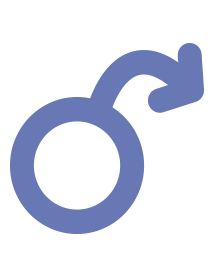It only makes sense if you feel exhausted. You’re a busy man. Between your responsibilities to work, family, relationships, other commitments, and your own health and well-being, you hardly have a moment to breathe. You have to pay bills, keep your family stable, and please your boss. When you add in the complexities and stresses of modern life in this often-confusing post-pandemic world, it’s no wonder you feel tired all the time.
What’s causing your tiredness? That lack of energy leaving you feeling depleted at the end of each day. Yes, sometimes we’re tired because we’re burning the proverbial candle at both ends. But sometimes there are other reasons. Medical reasons, even.
Let’s take a look at some of the common reasons for fatigue and exhaustion. As you start to recognize similar tendencies in yourself, you’ll be able to see what steps you might take to regain the energy you had as a younger man.
Common Causes of Fatigue and Exhaustion
We’ve all experienced the feeling of pushing ourselves too hard and being exhausted as a result. If you run an Ironman triathlon, you’re going to feel tired afterward — and let’s face it, some of us are completing the work equivalent of the Ironman every week without giving ourselves time to recover.
That’s not the point being discussed here. We’re talking about that feeling of pervasive fatigue without a clearly identifiable cause. Yes, you’re working hard, but that doesn’t explain how you feel. You’ve been getting enough sleep (or close to it), yet the effort to drag yourself to the next thing on your calendar feels overwhelming.
When a day or two of rest doesn’t relieve your feelings of exhaustion and fatigue, it’s time to start asking about deeper, more intangible reasons for your lack of energy.
Serious medical conditions that can cause fatigue include cancer, heart disease, chronic obstructive pulmonary disease (COPD), and kidney disease. These conditions, of course, often have other more obvious symptoms to point to a reason for your fatigue. Various medical treatments (such as chemotherapy) and medications can also be at the root of fatigue.
However, more often than not, fatigue and exhaustion are secondary symptoms to other underlying medical issues. Many men experience tiredness as a symptom of the following:
- Anemia: Anemia occurs when your body doesn’t produce enough red blood cells. When that happens, your body’s cells don’t receive the levels of oxygen they need to stay healthy and energized. One major cause of anemia is a lack of sufficient iron in the blood. Since many people ingest iron through red meat, men who don’t eat meat are often at risk for anemia. Frequent blood donors may also end up anemic. Without that needed iron in your blood, you’re going to feel weak and tired.
- Depression: If you’ve been diagnosed with clinical depression, you’re likely to feel yourself very low on energy. That diagnosis may not tell the whole story, though, as many other medical conditions can feed into depression.
- Low thyroid levels: Your thyroid levels are among the hormone levels that can affect the amount of energy you have day to day. Your doctor can check your thyroid numbers easily with some simple blood tests — and they’re likely to order those tests if you also report symptoms that include dry skin, sensitivity to cold, and recent weight gain.
- Low testosterone levels: Testosterone is the key to men’s sense of vitality, and when its levels drop below normal, fatigue can be just one result. Low testosterone can also be a driver of depression and insomnia, compounding tiredness from several angles at once.
Testosterone and Fatigue
Testosterone is a vital hormone keeping your body healthy and energized. While the interplay between testosterone and energy levels is complex, men with clinically low testosterone levels experience greater levels of fatigue than most men.
Men whose testosterone levels are below normal are likely to feel low-energy much of the time. To compound the matter, insomnia is another frequent symptom of low testosterone. Once you get into this vicious cycle, you’re likely to spiral downward into pure exhaustion. You don’t get enough sleep at night because of the insomnia, so you’re tired during the work day — but you don’t have the hormonal reserves you need to generate energy again. So, you hit the pillow even more tired the next night, only to sleep poorly again… and the cycle continues.
The relationship between testosterone and stress also feeds into the symptom of fatigue. When you’re dealing with stress, no matter its source, your body has a regular, predictable response: it produces cortisol, sometimes called the “stress hormone.” But cortisol, unfortunately, hinders your body’s ability to produce testosterone. So, you’re stressed and need a boost of testosterone to fight back — but you can’t access the testosterone required. As a result, you experience more fatigue, with fewer resources to fight back against stress.
Low testosterone levels are also associated with lack of mental clarity or “brain fog.” When your brain feels as tired as your body, you’re unlikely to summon up the mental energy needed to keep yourself going or to find a solution. That’s why a visit to your men’s health clinic for testing can be so important.
What Are Low Testosterone Levels?
You probably first became aware of testosterone when you hit puberty and started going through all those well-remembered physical changes. You may now think of it as the hormone which fuels your sex life. Those facts about testosterone are both true, but this vital hormone is far more tied up in your overall health and well-being than you might expect.
Testosterone affects every part of your body, such as:
- enabling you to build lean muscle mass
- making it possible for you to maintain a healthy weight
- driving your mental concentration
- helping you maintain focus
- keeping your bones whole and strong
- supporting healthy, refreshing sleep
- pushing back against depression and brain fog
Feeling tired all the time isn't the only option
It’s not surprising if you start to notice loss of testosterone throughout your body as you get older. And yes, you do lose testosterone with age. That process is natural, and it begins in your 30s. Most men can expect to see their testosterone levels decline about 1% per year after that. By the time you get into your 50s and 60s, that tiny number starts to add up.
Many men will not experience low testosterone levels, even with that natural decline. But many others find their overall testosterone levels fall below the normal range, which is 300 to 1,000 nanograms per deciliter of blood. When that occurs, unexpected symptoms, including fatigue, can occur.
What Can You Do to Fight Fatigue and Exhaustion
If you’re dealing with fatigue and exhaustion on a regular basis, you can make some lifestyle changes that may help. Practicing positive sleep hygiene can make a big difference if you find you’re not sleeping well. Maintain a regular sleep schedule, and don’t use your bedroom for anything but sex or sleep. Step away from screens before bedtime, and see if your electronic devices offer you a yellow-light option for nighttime use. Keep your bedroom dark, cool and quiet, wearing eye shades and earplugs if needed.
Keeping your body healthy and fit can also boost your energy levels a bit. Don’t skimp on your workouts and daily activity, even if you can only squeeze in a quick walk or a short yoga class. Minimize your intake of sugar, fat, and alcohol to help promote energy production within your body — and lowered alcohol intake will also help push back against insomnia. That healthier lifestyle should help you lose any excess weight, which also feeds into your fatigue levels.
There’s only so much, however, that lifestyle changes can do. If your fatigue and tiredness is caused by a medical condition, such as low testosterone, getting to the root of the matter is the only way to create long-lasting change.
Getting Your Testosterone Levels Tested
It’s easy to get your testosterone levels checked — but you want to do that in conjunction with a qualified men’s health doctor who understands how to relate your lab results to your symptoms before coming to an accurate diagnosis. If your persistent fatigue is the result of low testosterone levels, there’s a good chance you’re experiencing other symptoms of testosterone deficiency as well. Make sure to discuss the following symptoms with your doctor:
- Mood swings
- Loss of sex drive
- Depression
- Anxiety
- Memory problems
- Loss of focus or concentration
- Erectile dysfunction
- Weight gain
- Loss of muscle mass
- Insomnia
All these symptoms can occur as a result of low testosterone levels — and if you don’t know to keep an eye out for them, you’re unlikely to pinpoint the way in which they’re all related. If you’re experiencing multiple symptoms like this, it’s time to get your testosterone levels checked. If you’re diagnosed with low testosterone, your doctor will talk to you about your options, which may include testosterone replacement therapy.
Testosterone Replacement Therapy
Many men are surprised at how thoroughly and emphatically this treatment works to push away symptoms of tiredness and fatigue, even if they’re coming to the therapy with greater concerns about other symptoms. If your doctor determines your testosterone levels are in need of a boost, this therapy might be beneficial. You can expect to experience a drop in both your physical and mental symptoms of fatigue, with heightened energy and greater ability to concentrate, remember and focus.
Find Out Why You’re So Tired All the Time
There are answers to the question of why you’re always tired, and we want to help you find them. If you suspect your testosterone levels might explain your fatigue—perhaps because you’re also experiencing other related symptoms—we make it easy to get the blood tests you need. We’ll help you understand how your fatigue is related to other symptoms and talk with you about what you can do to remedy it.
Walking through life exhausted isn’t normal. Dreading your work week on a Sunday evening because you’re so much in need of rest is no way to live. You don’t have to feel this way all the time. Imagine, instead, feeling the kind of energy you felt in your 20s. Facing each day with plenty of energy and vigor. Knowing you can deal with whatever life brings you because you won’t be stumbling forward with a muddled, tired brain.
We’re ready to help you optimize your hormones to fight fatigue and the other effects of aging. Contact us today to learn more about testosterone testing and how we can help you restore your energy and defeat fatigue and tiredness.


